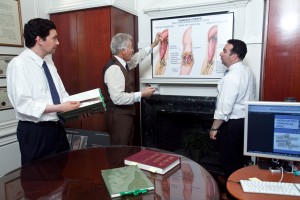NJ Top Rated Workplace Injury Attorney
On-the-job injuries occur far too often in the U.S. In 2012, nearly 3 million workers suffered nonfatal workplace injuries and illnesses, according to the Bureau of Labor Statistics. More than half of these 3 million injuries resulted in days away from work, job transfer, or job restriction. Even more troubling, 4,628 workers were killed on the job in 2012, averaging out to 89 deaths per week and more than 12 deaths every day.
Workers have the right to a safe workplace, and failure to look out for workers’ safety can lead to serious injuries and illnesses. If injured at work, workers can file for workers’ compensation through the New Jersey Division of Workers’ Compensation.
What is Workers’ Compensation?
Workers’ compensation is an insurance program designed to provide wage replacement, medical treatment, and compensation for permanent disability for employees who suffer work-related injuries. If a worker suffers a fatal injury on the job, his or her dependents are also entitled to death benefits through workers’ compensation.

Workers’ compensation is a “no fault” program, meaning the injured employee can receive benefits regardless of who was at fault in the incident. In exchange for benefits guaranteed by workers’ compensation, the injured employee forfeits the right to bring a civil suit against the employer for pain and suffering or other damages (except in cases of intentional acts). However, workers can file a personal injury suit against a third party—often in addition to a workers’ compensation claim—if the third party’s negligence contributed to the injury; a personal injury suit allows injured workers to recover damages not available through the worker’s compensation program and hold third parties accountable for creating unsafe work conditions.
The New Jersey Division of Workers’ Compensation administers the New Jersey Workers’ Compensation Law by:
- Ensuring injured workers receive fair and timely workers’ compensation benefits from employers and/or insurance carriers.
- Enforcing the law that requires employers to secure workers’ compensation insurance coverage from commercial carriers or self-insurance programs.
- Providing temporary disability benefits and medical expenses to workers suffering from compensable injuries while working for uninsured employers.
- Providing benefit payments to workers who are totally and permanently disabled as a result of their last work-related injury combined with pre-existing disabilities. (These benefits will start at the conclusion of the employer’s benefit payments.)
What Should You Do If You Are Injured At Work?
1. Report the injury
If you are injured on the job or suffer an occupational illness, immediately report the injury to your employer. Notice should be given to the employer as soon as possible but not later than 90 days from the accident.
It is extremely important to notify your employer that you were injured AND that the injury was caused by your job; failure to report a work-related injury can lead the employer to deny the accident occurred or claim the accident happened outside of the workplace. In addition, make sure you know your employer’s internal deadlines for reporting workplace injuries, as failure to report an accident in the given time frame can result in consequences like suspension or a formal citation.
2. Seek medical attention
Severe workplace injuries typically receive immediate medical attention. However, if the injury comes on more slowly, is not noticed right away, or the extent of the injury is not clear immediately after the accident, make sure to seek medical treatment as soon as possible.
Seeking treatment from a board-certified physician will bolster your claim for medical expenses, and visiting a doctor in the state of New Jersey will make it easier for him or her to testify in the event medical testimony is necessary for your case. When seeking medical treatment, make sure the doctor knows you sustained the injury or illness at work.
3. Consult an attorney
The sooner you consult an experienced attorney, the better. You have the right to representation by a lawyer, who will collect all medical records and appropriate medical evaluations to present in the case of a hearing. An experienced workers’ compensation attorney knows the ins and outs of workers’ compensation and can help you fight for the compensation you deserve during a difficult time for you and your family.
Verdicts and Settlements
$3,200,000 - Construction Accident
To a 35 year old iron worker who fell from a steel frame building under construction due to the failure of the general contractor to provide a safe workplace which included supervision for the use of safety equipment and guide wires.
$300,000 - Fall From Elevated Planking
Settlement in the case of a 62 year old electrician’s helper who died after falling from loose planking at a height of 22 feet in a boiler room at an apartment complex.
$425,000 - Labor Law
Settlement under the New York Labor Law for a fall from a ladder by worker who suffered severe back injury.
What Qualifies as a Work-Related Injury?
According to the Occupational Safety and Health Administration, an injury or illness is considered work-related “if an event or exposure in the work environment either caused or contributed to the resulting condition or significantly aggravated a pre-existing injury or illness.”
If the injury or illness occurs in the physical workplace, it is assumed to be work-related unless one of the following exceptions exists:
- The employee was present in the workplace as a member of the general public (not in an employee capacity) at the time of the injury or illness, or when the employee is performing personal tasks unrelated to employment outside of assigned working hours
- The injury or illness involves symptoms that surface at work but result solely from a non-work-related event or non-work-related exposure
- The injury or illness results solely from voluntary participation in a wellness program or medical, fitness, or recreational activity (such as donating blood, playing a company baseball game, getting a flu shot, or undergoing a physical examination)
- The injury or illness is solely the result of the employee eating, drinking, or preparing food or drink for personal consumption, such as choking on a sandwich purchased from the cafeteria at work. (However, the case is work-related when the employee falls ill by ingesting food contaminated by workplace contaminants or gets food poisoning from food supplied by the employer.)
- The injury or illness is self-inflicted or the result of personal grooming or self-medication for a non-work-related condition
- The injury is caused by a car accident and occurs in the company parking lot or on the access road during the employee’s commute
- The injury is a mental illness, which is not considered work-related unless a physician or other healthcare professional reports otherwise
What If A Workplace Injury Was the Result of Negligence?
Employers have certain protections under workers’ compensation laws, including protection from civil suits brought by injured workers. However, injured workers can file a lawsuit against someone other than the employer; many workplace injuries result in both a workers’ compensation claim and a personal injury case.
Third-party negligence contributing to a workplace injury varies depending on the workplace and the circumstances of the incident. All U.S. workers are entitled to safe work environment that is free from both unnecessary hazards and careless workers. The manufacturer of unsafe equipment, the driver of the car that struck you, the distributor of unsafe chemicals, the contractor at the construction site who failed to provide a safe work environment, or the vendor working at your place of employment who created a safety hazard are all examples of third-party individuals who can be found liable for your workplace injury.
Filing a personal injury case allows you to collect money for damages not covered by workers’ compensation programs. Workers’ compensation can provide for pre-approved medical expenses, disability, and roughly two-thirds of the employee’s average wages, but a third-party personal injury lawsuit allows you to collect damages for all lost wages, employer contributions to retirement plans, and anticipated future medical care.
What Benefits Are Available Through Workers’ compensation?
Through workers’ compensation programs, injured workers are entitled to:
- Medical benefits, which includes all necessary and reasonable medical treatment, prescriptions, and hospital services related to the work injury. (Employers and/or insurance carriers have the right to designate medical providers for treatment of work-related injuries.)
- Temporary total benefits, which compensate an injured worker who is unable to work for a period of more than seven days. Temporary total benefits are retroactive to the first day of lost time and are paid at 70 percent of the worker’s average weekly wage (not to exceed the maximum rate or fall below the minimum rate established by the Commissioner of Labor and Workforce Development). These benefits are provided until the worker returns to work, has reached maximum medical improvement, or has reached the 400-week maximum.
- Permanent partial benefits, which are paid to workers who suffer permanent bodily impairment as a result of a work-related injury. These benefits are paid weekly for an initial period of 450 weeks; benefits continue beyond that point if the injured employee can show he or she is still totally disabled. Permanent partial benefits are paid at 70 percent of the average weekly wage (not to exceed or fall below legal requirements).
- Death benefits, which are paid to dependents of a worker who was killed by a work-related injury or illness. Death benefits and funeral expenses are capped at $3,500 and are paid at 70 percent of the deceased worker’s weekly wage (not to exceed or fall below legal requirements).
Why Hire an Attorney for Workers’ Compensation?
Injured workers are entitled to adequate representation during the workers’ compensation process. When your employer and employer’s insurance carrier are stacked up against you, it is extremely beneficial to have a legal representative who can fight for your compensation.
Attorneys are prohibited from charging a fee in advance for legal services for workers’ compensation. Only a judge of compensation can award legal fees, and fees can only be ordered if a compensation award is made. In other words, it is in your best interest to be fully represented during the workers’ compensation process, and expenses are only incurred if your claim is successful.
Maggiano, DiGirolamo & Lizzi have extensive experience handling workplace accidents and injuries. If you or a loved one has been injured on the job, call (201) 585-9111 or fill out an online inquiry to schedule a free and confidential consultation. You deserve skilled, aggressive representation, and Maggiano, DiGirolamo & Lizzi will fight to hold the negligent parties accountable for your injuries.

















